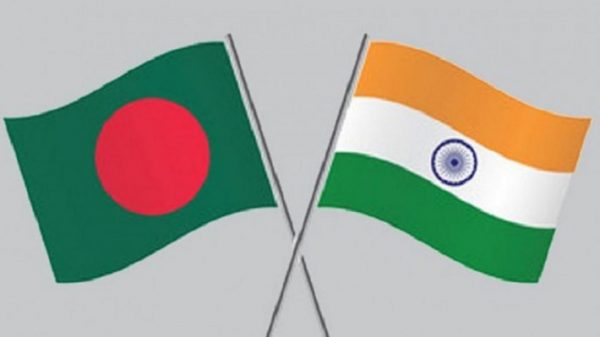Indo-Bangladesh Friendly Ties Getting Stronger

- Update Time : Monday, December 21, 2020
- 160 Time View

Nationalism is basically a strong feeling for a certain territory. The collective feeling of an entire population living in a certain territory may be termed as one kind of nationalism.
Such a feeling can be created through various means such as race, religion or language. Based on different ingredients, this nationalism can be evolved. But, generally, nationalism does not evolve based on a single ingredient. We may cite an example of religion. From time immemorial, religion has united the people of different regions across the globe. Again, unity based on religion did not always sustain. Science and technology developed through economic, social and political evolution. Simultaneously, production management has advanced. On many occasions, unilateral influence of religion on the lives of people decreased. Again, most of the religions have no geographical boundaries. Actually, Islam or Christianity has expanded in different regions of the world. Despite the fact, the Christian and the Muslim world has been divided into different states. A collective sense of tradition is of utmost necessity behind the rise in nationalism. This sense of tradition has made the Bangladeshi nationalism more distinct.
While studying in Calcutta (now Kolkata) Islamia College, Sheikh Mujibur Rahman got involved in active politics of Muslim League. At that time, he supported the Pakistan movement thinking that poorer section of population, most of whom are Muslims, will be freed from economic exploitation of Hindu zamindars and landlords through emergence of Pakistan. Their democratic rights will be established. During Khilafat movement, an unprecedented renaissance was observed among the Muslim community of Bengal. Till the first part of this century, the personalities who led the Muslim community of Bengal belonged to aristocratic class. Urdu was their language. On the other hand, most of the poor Muslims spoke in Bangla. They were termed as people of low castes. Muslims belonging to high castes were educated and they lived in cities. The leadership of entire Muslim community of Bengal was in their hands. Starting from the 19th century Muslim leaders of Bengal, Nawab Abdul Latif, Nawab Salimullah and even Khawaja Nazimuddin belonged to the aristocratic class.
At the fag end of 1969 when a mass upsurge took place against the military rulers of Pakistan, Bangabandhu Sheikh Mujibur Rahman firmly announced that from now on East Pakistan would be termed as Bangladesh. During this period, from a mammoth meeting, Sheikh Mujibur Rahman was bestowed with the title of ‘Bangabandhu’ on behalf of students and general people. Under the leadership of Bangabandhu Sheikh Mujibur Rahman, the entire population of Bangladesh consisting of people of all communities including Hindus, Muslims, Buddhists and Christians turned into an undivided nation. This was not seen before. During this period, an unprecedented patriotism was marked among the Bengali population of this region. After independence of Bangladesh, Bangabandhu was freed from Pakistani prison and he arrived in Dhaka on January 10, 1972. In his first address, he said: “I want to unequivocally declare that Bangladesh will be an ideal state. And its foundation will not be based on religion. The state foundation will be democracy, socialism and secularism where the country’s peasants and workers, Hindus and Muslims will live happily. Everyone will live there peacefully.” Through this extra-ordinary speech, Bangabandhu clearly expressed the basic principles of the state.
Today there are many things to learn from past experience, not only for Bangladesh but also for the neighbouring India. And that learning got expression. It is being stated for maintaining continuity for advancement through maintenance of friendly Indo-Bangladesh ties. Not only for the sake of the past tradition, a path is also being created for future advancement. And that is done when a virtual meeting was held between Bangladesh Prime Minister Sheikh Hasina and Indian Prime Minister Narendra Modi. In the virtual bilateral meeting held on December 17, the Bangladesh premier said: “Our relationship is passing through an epoch-making stage. As an independent nation, Bangladesh is going to celebrate its 50 years of founding. The 50th year of establishing Indo-Bangladesh diplomatic relations also falls in the same period. Moreover, we are celebrating the Birth Centenary of the Father of the Nation Bangabandhu Sheikh Mujibur Rahman. Only a few months ago, we celebrated Gandhi Jayanti 2020 paying tribute to your Father of the Nation. Marking the occasion, we have released a postal stamp as a mark of respect towards him. Today, we shall release an Indian postal stamp as a mark of tribute to Bangabandhu.”
One thing is getting clear. In this corona-afflicted world, the Indo-Bangladesh relationship should be strengthened to such an extent that the welfare of people gets preference over all others. So, after the virtual meeting, the Indian PM said: “As a neighbouring country, Bangladesh is very important to us. After taking over the responsibility of premiership, I have given priority on strengthening ties with Bangladesh. After the Indo-Bangladesh virtual meeting, it has been proved again that the message of Bangabandhu is immortal.” The Indian premier is taking preparation to visit Bangladesh. And because of this reason, the Indian High Commissioner in Dhaka has become very active. What is being readied is that both the countries must have to take forward the economic issue. Rail and road communications must have to be expanded. On the other side, India has given a firm assurance to bring down border killings. Despite regular flag meetings between the Indian Border Security Force (BSF) and the Border Guard Bangladesh (BGB), incidents of border killings by the BSF are on the rise. And these incidents are sufficient enough to sour the bilateral relationship.
Sometime ago I went to Dhaka University to take part in a discussion meeting. At that time, Bangladeshi students raised a flurry of questions. The memory of a dead Bangladeshi girl hanging in barbed following her murder by the BSF is still fresh in the hearts of the countrymen. However, the fundamental force who is out to harm the Indo-Bangladesh ties is trying to get advantage from this picture.
Bangladesh Foreign Minister Dr A K Abdul Momen has stated that India is very sympathetic towards all issues relating to Bangladesh. Indian PM Narendra Modi has agreed to stop border killings. He has committed to bring down border killings to the zero level. He has also pledged that the BSF will refrain from using firearms in border areas.
Today, in the ongoing Mujib Year, discussions are going on about the destinations of Bangladesh and India. I am studying various interviews and writings. Dr Muhammad Shahidullah once expressed that it is true we are Hindus and Muslims. But, it is truer that we are Bengalis. This is not a statement of any ideal, but it is a reality. Mother Nature has provided us with a unique Bengali characteristic that cannot be hidden by Hindu or Muslim costumes. Both Rabindranath and Nazrul have succeeded in uniting the culture of the two countries. Not only Kolkata-Dhaka, but New Delhi also accepted the Bengali ideal in heart. That is a great power in diplomacy. In this situation when we observe the reopening of the Chilahati-Haldibari rail communication, preparations are afoot for Narendra Modi’s visit to Bangladesh.
On the auspicious occasion of establishing train link between Bangladesh and Paschimbanga, Chilahati Railway Station wore a festive look. On the occasion, a pandal was set up on the spot adjacent to the railway station accommodating 1,000 people. Since the British period, Chilahati-Haldibaria was the major railway link in the undivided Bengal. Through this line a number of passenger trains and goods trains used to run between Darjeeling and Calcutta via Khulna. Centring the railway link, a number of business organisations were set up at Chilahati. Business people from different parts of the country gathered at Chilahati where they set up a merchant association.
Indo-Bangladesh friendly relation is now getting stronger. Those who damaged the statue of Bangabandhu and are trying to trample his ideal of Bengali nationalism, should be dealt with strongly. But it is not only the responsibility of Bangladesh, but also that of India.
The writer is a senior journalist of India.
Translated by Z A M Khairuzzaman.



















